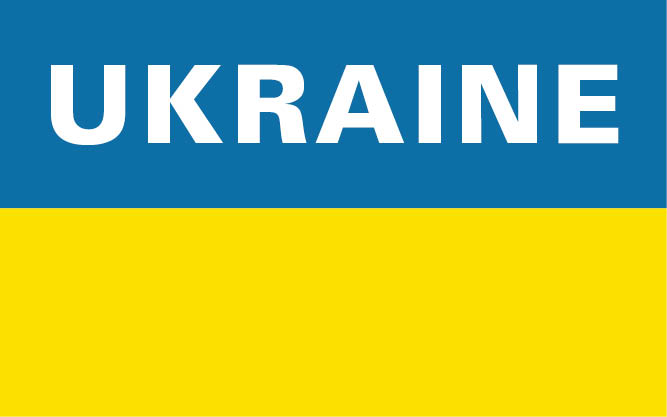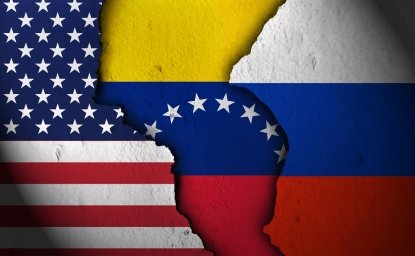- Part of The Russia File
- Podcast
The Kremlin's Favorite Scapegoat: The Latest Attack on LGBTQ+ Rights in Russia

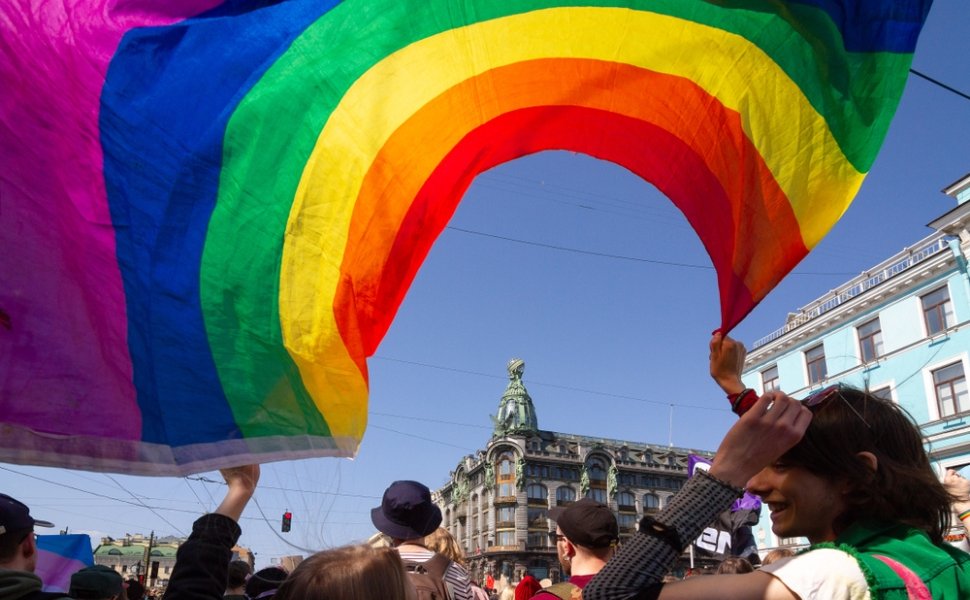
In November 2022, the Russian parliament passed a new bill banning any activity that can be interpreted as the promotion of “non-traditional sexual relations and/or preferences.” In December, President Vladimir Putin signed it into law. This legislation is an expansion of the notorious 2013 bill, which prohibited so-called “gay propaganda” among minors. Nina Rozhanovskaya spoke with Dr. Alexander Sasha Kondakov about the repercussions of this discriminatory legislation, the rationale behind Russia’s crackdown on the LGBTQ+ community, and what its timing can tell us about Russian politics. The conversation was recorded on November 30, 2022.
Show Notes
- Violent Affections: Queer Sexuality, Techniques of Power, and Law in Russia, by Alexander Sasha Kondakov, UCL Press, 2022 (Open Access)
- Queer in Russia: A Story of Sex, Self, and the Other, by Laurie Essig, Duke University Press, 1999
- Illegal Queerness: Russian Culture and Society in the Age of the “Gay Propaganda” Law, The Russian Review, Volume 80, Issue 1, January 2021 (thematic issue)
- “The Kremlin’s Othering Russians as Part of Its War on the West,” by Maxim Trudolyubov, The Russia File, December 2022
- “Do Russians Give a Damn About Homosexuality?” by Alexander Kondakov, openDemocracy, June 2013
Episode Transcript
-
The Kremlin's Favorite Scapegoat: The Latest Attack on LGBTQ+ Rights in Russia
The transcript has been lightly edited for clarity.
Nina Rozhanovskaya: Hello and welcome to The Russia File. I am Nina Rozhanovskaya. This November, both houses of the Russian parliament voted in favor of legislation creating new restrictions on freedom of expression regarding sexual orientation and gender identity. The bill outlaws any positive depictions of same-sex relationships and is a continuation of the law that was adopted in 2013 to ban so-called “gay propaganda” among minors. Today, we are going to discuss the implications of this discriminatory legislation and the political rationale behind its adoption.
For that conversation, my guest is Dr. Alexander (Sasha) Kondakov. Dr. Kondakov is an assistant professor at the School of Sociology, University College Dublin, Ireland. And his work is primarily focused on law and sexuality studies and more specifically on queer sexualities. His latest research on violence against LGBT people in Russia is very relevant to our conversation today. Sasha, welcome to the program.
Alexander Kondakov: Thank you very much. Thank you for having me. And I hope [to] make at least some sense of this senseless law.
NR: Thank you. And before we start, I know that you've recently published a new book. Could you maybe say a few words about it?
AK: Well, the book is called Violent Affections. And its main question is to uncover how emotions, especially violent emotions, circulate in a society and how, for example, powerful annunciation of the state in a form of law can trigger emotions and make some people think of killing other people. In the example of the LGBT population in Russia, I'm investigating the reasons behind violence against LGBTQ people in Russia triggered by the 2013 reiteration of the gay propaganda law.
NR: That is certainly a very uncomfortable but extremely important topic. And I personally look forward to reading that book and will make sure to include the link in the show notes.
AK: The book is actually available for free. It is an open-access book.
NR: Thank you for that. And now, before we discuss the details of the new legislation, I just wanted to ask you about the current state and status of the LGBTQ+ community in Russia before this bill. How visible is this community and what challenges do LGBT people and their allies already face in Russia?
AK: Well, male homosexuality was criminalized in the Soviet Union, and it was decriminalized, that is withdrawn from the criminal law, in 1993, right after the Soviet Union collapsed. But as for the state of LGBT rights in Russia since then, nothing has been done in either a positive or negative way in making sure that LGBT rights are respected. There was no recognition of LGBTQ identities in law or in more general culture, but there were some things available through the liberties and freedoms guaranteed by democracy after the fall of the Soviet Union, like concerts, theaters, gay clubs, books on queer topics. Academic science, like for example, what I've been doing. I actually worked in Russia for some years. That was also part of the landscape. And I think people started to feel more and more safe, even though the everyday climate of LGBTQ experiences in Russia wasn't always great. [Then] the first 2013 gay propaganda law happened and, as my research shows, it actually triggered brutal violence against gay people there.
NR: We'll get to that in more detail later. But indeed, you've mentioned decriminalization in 1993 and as a person growing up in the ‘90s in Siberia, of all places, I, at least looking back, feel that was the time when even if the state didn't interfere much and didn't try to improve things, things sort of improved on their own, as in the society was, at least it seemed, growing increasingly more accepting of different sexualities and more tolerant. So do you feel that it all changed in 2013? Or did something start to happen before?
AK: Many constraints, such as the criminalization of same-sex intercourse, were indeed dismantled. But no anti-discrimination law in relation to queer sexual orientation was introduced. Moreover, if you look at law enforcement agencies’ practices, you see that even without legal grounds, even without specific pieces of legislation, law enforcement agencies in many regions across Russia would put a lot of constraints on LGBTQ people's lives in different domains. Some police officers and prosecutor's offices, even before 2013, already tried to limit dissemination of information on LGBTQ issues.
Or if you take LGBT organizations, all of them had troubles registering as an official civil society organization, which would mean a lot of both legal and just symbolic things for the LGBT community there. Or if you take organization of public events such as LGBT pride [parade]s, but not even that. The LGBT film festival in St. Petersburg, for example, faced a lot of troubles and many of those troubles were posed by law enforcement agencies and the state more generally, even without any law that would negatively impact LGBT rights and experiences. So even before 2013.
NR: And this film festival, I assume you are talking about Side by Side. It did travel around and I remember that there was so much unofficial pressure that local organizations, hotels, and venues, which were ready to accept them, had to deny them the right to organize their movie screenings.
AK: Exactly.
NR: Because someone made a phone call, some public official at the city level, maybe was not even instructed to do that by anyone from Moscow. It could have been a local initiative. And they had to basically do it underground. So people could still go and watch, but it was becoming more and more like something completely illegal and completely on the fringes of society.
AK: In the best-case scenario, they could do it underground, but sometimes they were denied premises and they didn't have the opportunity to show all those films, even to adults. And I don't know if you remember that they had a lot of attacks from conservative civil society, calling to the police and saying that there is a bomb in the venue, where a Side by Side screening would have taken place.
NR: And obviously we keep referring to the legislation, let's just make it extremely clear, we have the legislation from 2013 and then we have this new bill, from 2022. Could you please just briefly explain the difference? What happened 10 years ago and what are the new restrictions placed now?
AK: So the 2013 law, it's actually not called gay propaganda law, but it does prohibit what the Russian authorities call propaganda of nontraditional sexual relationships. This is a very broad definition. I think in the English language, you can compare it to the concept of queer, for example. It is also very broad, and everything can be included into it.
It's an administrative law. It's not a criminal law. So nobody is supposed to go to jail for it. It's a different procedure, administrative procedure; even though some decisions can be taken to an administrative court, still a law enforcement agency’s enforcement of the law is actually enough. They withdraw the information from the public domain, the information that is deemed propaganda of non-traditional sexual relationships.
Then what else? This “propaganda” is punished with fines. And it's supposed to be accessible to minors in the 2013 legislation. So basically, it's a censorship legislation that claims it protects children from certain kinds of information about LGBTQ, about queer sexualities.
NR: So basically, a teacher or a counselor would not be able to talk to a child who thinks that they might be non-heterosexual. They would not be able to discuss sexual identities with a child, for example. Or you would not be able to, I don't know, release a movie that would be accessible to children and have gay characters. I remember the story about Beauty and the Beast getting the rating 18+ for the simple reason of having just one gay character in an essentially children's story. So that would be the range of issues people would face.
AK: It's not supposed to be this range, if you approach it more legalistically, because propaganda is something that is usually publicized. So a personal conversation or even a professional conversation of a counselor is not supposed to be included into this. But then, on the level of actual enforcement of the law, there are cases when even individual communication is deemed suspicious. But basically what they were thinking about was public events, street rallies. So you cannot organize an LGBT event there. You cannot publish an article or an interview, for example, with a gay person or a same-sex couple in a newspaper that is accessible to children. And you cannot teach about something in schools, about LGBT rights, for example.
And if you look at law enforcement practices, this is exactly what they more or less tried to prosecute, this kind of instance of talking about LGBTQ issues, the public events, media publications, schools. But any censorship law has actual enforcement, and it has another dimension, self-censorship. So there are people who interpret what the law is about and make their individual decisions, whether or not to talk about certain topics. This is another dimension of this law, a different point. When you look at the cases that reach the court, the potential child is enough to make a case against this information.
NR: We should also mention probably that 2013 law was deemed discriminatory both by the UN Human Rights Commissioner and by the European Court of Human Rights. So quite a few organizations around the world—not just LGBTQ activist organizations, but all sorts of international organizations, which Russia is part of—deemed that disproportionate, discriminatory, and well, not very lawful, but that did not lead to any consequences. And the Russian government persisted.
AK: On the contrary, the government insisted on introducing this new iteration of the law and making it harsher, making the penalties, fines bigger. Now you pay more for alleged propaganda and now also the harm to children is withdrawn from the text of the law. So this supposed propaganda is prohibited among everybody, people of all ages in Russia.
NR: So basically the legislators took a step from ostensibly, allegedly protecting the children to just creating a blanket ban on any positive depiction of any non-heterosexual relationships or identities. Is that correct?
AK: Yes, yes. And they added more about the sexuality part of the law. In the 2013 version, nontraditional sexual relationships were covered; now it’s also pedophilia and it's, I don't remember exactly how they call it, desire to change your gender.
NR: I would assume that adding transgender aspects, emphasis on the desire to change one's sex, is probably a reaction to that being an important part of the social agenda in the West, which is so triggering for Russian legislators. But I had a question about another aspect. They do indeed lump together sexual identity, gender transition, and pedophilia. Is that meant to create moral panic and to rally public support for this legislation, or do they really not understand the difference?
AK: I think it's all a manipulating technique only. Its only purpose is actually to try to amass support, try to— through stigmatization, through these hateful messages, and through triggering violent affections in people, through these manipulated political techniques—to exactly what you said, rouse support from certain fractions of Russian society. And whether it works or not, especially this time, is a big question. But this is definitely the intention. And this conjunction of homosexuality or non-heterosexuality with pedophilia is a classic move. It's been done in many different countries, in many different societies throughout the history of humanity, and the politicians think it works. You just put those two words together and people get it. So they use it. They use it as a manipulating technique.
NR: Well, and probably it does work to some extent. Your research focuses, among other things, on violence against LGBT people. So would it be correct to assume that the previous iteration of the law caused an increased occurrence in hate crimes? Did it already have that effect? And do we expect a similar effect, increased level of violence, from this new iteration?
AK: My starting point is always that there is a piece of legislation, there's law, and it has its purposes. But its effects are different from that. We've already discussed [that] there is direct application of the law, the censorship. There is indirect application of the law, self-censorship. But there are other multiple effects of this law. For example, people fleeing from Russia in fear of being targeted because the law is stigmatizing. So people try to escape, and rightly so.
But one of the effects that I discovered was…rising levels of violence. It started exactly in 2013, when such violence as inflicting of injuries [on] and the murder of people with LGBTQ+ sexualities increased in Russia. And by 2015, so just a few years ago, the number of these types of crimes doubled. I regard this as a direct effect of this law. Some people heard the discussions online, on TV, of the law and decided that “well, this is a stigmatized community and we will target them.” And those people were kind of directly encouraged by the government to do so.
What about this new iteration? Well, here I have some doubts, because it should be taken in context. Russia in 2013 is one thing and Russia in 2022 is so different. There is all this discussion on the Russian TV, in media, centered on identifying and scapegoating stigmatized communities. The Ukrainians play the most important unfortunate role here, in this propaganda on the TV. So the government now adds LGBTQ+ people into this mixture. But the context is already so violent that I'm not entirely sure it will work in the same way this time.
NR: I can totally see your point, because in 2013, LGBTQ people were basically singled out in the population, and the government did not necessarily say “attack them,” but it implied that it will not protect them if something happens, while today there are so many targets, indeed: the so-called foreign agents, journalists, activists, opposition leaders. Just so many people are already not safe, that it’s just yet another group. In a way, it might shield people from at least some of the consequences, one could say.
But on the other hand, you’ve mentioned escaping from Russia. And isn't it one of the additional difficulties today that wasn't present in 2013? It is so much more difficult to leave. Russia is increasingly isolated. There are restrictions placed on the outside in terms of visa bans and entry bans, and there are restrictions from the inside. For example, young gay men are not exempt from mobilization, so they are in danger on both terms. And physically escaping is difficult, isn't it?
AK: Oh, absolutely. There are very few escape routes. I think it's more or less impossible to get a visa to the U.S., for example, or to any European country. It's close to impossible, but at the same time, so many people are running away. And what those people do, they are discovering new routes. Former Soviet Union states, where you can go with your internal passport or where you can go without a visa, are accepting more and more Russian citizens fleeing from the country for a variety of reasons, including those who are LGBTQ+. Turkey is another destination, interestingly. In relation to our topic, it's actually now a question how many of those people who are, for example, queer will feel there. Because some of those countries, both former Soviet Union states, Turkey and many others, are actually also quite hostile to sexual diversity; surely it won't be a queer utopia or a bright future.
NR: It's scary how trapped some people find themselves nowadays, but I also saw that an LGBT rights organization—ILGA-Europe—ranked Russia number 46 among 49 European nations in terms of LGBTQ+ inclusion. So I guess [that] even if those people flee to countries that are not queer utopia, they probably will be better off in the long run.
AK: We just need to remember that, for example, one of those countries is Uzbekistan, where male homosexuality is still criminalized. I don't think that people are fleeing to Turkmenistan. It's very hard to get in there. But that's another example where homosexuality is criminalized. And Turkey: it is where things are not getting better, in terms of LGBTQ activism and everyday life, things are getting worse, with more authoritarian tendencies of the current government.
NR: So what you are saying is basically adding another layer to how we see the plight of Russian society at large. Different groups of people are facing different challenges based on their ethnicity, religion, gender identity and at some point might find themselves part of a group that is basically targeted on all levels.
AK: And all those everyday issues and troubles you don't even consider. In the LGBTQ community, there's a lot of conversation going on about HIV status, for example. People who are HIV positive need constant access to therapy. And it's not so easy to get that access when you are in an unknown immigration status somewhere outside of your normal residency. And it's just an example of course, but this is something that people are facing.
NR: Indeed, and we know that stigmatization leads to some very tangible problems, including in medicine and health care, as you’ve mentioned. And I do feel that some people who do not necessarily feel that they're homophobic, when they look at legislation and the Russian circumstances, they sometimes tend to disregard all those aspects. That it's not just about organizing pride [parade]s, it's not just about having gay characters in TV shows. It's a whole array of rights being taken away and quite tangible problems that a person has to deal with. Because of all the censorship and self-censorship and because it was a gradual process, it's not actually part of the general Russian public conversation at all.
AK: Well, especially nowadays, when this conversation is literally banned.
NR: And going back to the legislation and its effects. We have mentioned that there are legal repercussions, so a person or an organization could get a fine.
AK: Huge fines, like, I think 800,000 rubles, which is a lot of money, almost a million. And the Russian ruble isn’t a super expensive currency, but still, it’s a lot of money, it’s tens of thousands of American dollars.
NR: So a hefty fine could make a person go bankrupt and could definitely destroy a small human rights organization. So even without the jail term, it's pretty bad. And I've also read that foreigners could face deportation when they violate the law. But when it comes to industries, what are the main concerns now? I've read a lot about how the streaming services, the cinemas, the booksellers and book publishers are very concerned about the law because they're going be affected. Could you please comment on that?
AK: Well, it's censorship legislation, so it affects them directly. This is a law about all those industries that produce information. Media, publishers, producers of any kind of content on YouTube, and on TV: they all are covered by the law now. They are supposed to monitor whether or not they propagate nontraditional sexual relations. And if they think they do, they are not supposed to publish those kinds of things. And if previously they could just put a sign, 18+, on a book, for example, where there are gay characters, now they just can't distribute that kind of book anymore, because propaganda—we know…from the practice of almost 10 years of the first iteration of the law—propaganda means basically anything.
NR: But even before this new legislation, they started censoring new films. So, for example, there was this big story about the film Supernova with Colin Firth and Stanley Tucci. It's a whole drama about two gay men, a married couple, and they cut out the sex scene to sort of pretend that it's a movie about two really good friends. It's another step towards trying to make LGBT people completely invisible. It didn't work the previous time. As, for example, even with the previous restriction, one of the recent Russian bestsellers is a book called Summer in a Pioneer Tie. It's a coming-of-age story about a teenager who understands that he's gay and falls in love for the first time. So having this option of making it 18+, they could still publish it and it became a bestseller. Now it means that books of this kind will not be sold, will not be published, will not be translated. So what do people do? Do Russians resort to pirating books and films like they used to do before streaming became popular?
AK: Yes, I guess this is what's happening, if this regime of silence is being introduced. This erasure of LGBTQ+ identity, the very mentioning of something queer is being censored. Another thing here is why some people will want to access anything in relation to LGBTQ+ issues or rights if they are not part of the community. I mean, they can be genuinely interested, but usually it doesn't work like that. If you are not offered diverse content, you don’t consume diverse content. Why would people go to this kind of effort, to access content they're not interested in? This part is definitely being done by this thing. They regulate the media sphere, they regulate this informational landscape in a very particular way. They erase certain topics from appearing. If you want to, you will be able to get access to any kind [of information]. The problem is that many people don't want it.
NR: And basically, teenagers and adults who have already discovered gay fanfiction and TV series with gay characters will indeed find a way to download them and watch and read those books. And those who haven't will indeed be less motivated and less capable of finding this content. And that means the whole country's going back to pretending that Petr Tchaikovsky was not gay or that Dyagilev was not gay. And then you will go to a museum, to an exhibition of a famous Russian painter from the early 20th century, and the portrait of his lover [will be] labeled as his close friend. And that might seem funny when you know this full story, but when you don't, I guess you do live in a world where everyone is heterosexual, and no Russian has ever been gay. So the legislation is motivated by homophobia, but then this invisibility feeds homophobia in the society in turn. So it's like a vicious circle.
AK: It produces this kind of ignorance because you don't learn things, you don't know things. So that's going to be exactly the ethic, [though] maybe not as dramatic as in the Soviet Union, because we are starting from a different point. We already have the experience, we already have the history where there is at least a little bit of something queer in it. There is some kind of visibility that was guaranteed and that was part of everyday life in the ‘90s and beginning of the 2000s, sometimes [broadcasting] its queerness from the stage of the Kremlin concert hall, like the t.A.T.u. group, [which was] very popular. But still, there's an attempt to try and erase LGBTQ experience from history and from the present. I guess it will fail. But well, still, there will be some damage done.
NR: A question that was raised by my friend, she said, “I'm worried that under this legislation, even just being queer will be criminalized. Not discussing, advertising, reposting content, but just being gay.” Do you feel that is possible now? Do you feel it might be the next step, going back to the Soviet criminal tradition, or is it not possible in the 21st century in Russia?
AK: I think it's unfortunately possible. And I was of a different opinion before. But now, with the war and with everything, this insanity that is going on and sourced from the Kremlin, you can expect more or less anything. But here are facts. There were some bills over the course of the whole existence of the Russian Federation, introduced into the Duma, in the Russian parliament, with the idea of criminalizing same-sex sexualities, male homosexuality, lesbian sexuality, bisexuality. Those initiatives all failed. The parliament and the government said that they don't want to criminalize anything related to queerness, related to the LGBTQ experiences, but there is no guarantee, of course.
They can forget about their promises easily, as we know, if, for example, this time this manipulation strategy works and they will need it once again in a year’s time, when they feel they are again in a huge crisis. And they need something new. They need something to amass more support. And criminalization can be back on the agenda. I think it's possible, unless the regime falls before.
NR: That's a scary thought. But we keep bringing up them and the government and the state. But who are the actual actors behind? What's their agenda?
AK: I think they don't have any agenda or ideas. They have very pragmatic aims: to remain in power and to amass support, get political legitimacy from non-democratic institutions. In normal situations, you would introduce your ideas to the people and expect them to vote for your ideas. But this is not how Russia works, at least not currently. And I think the most important crisis was in 2011–2012, when this whole idea about other ways of legitimizing power—including by introducing scapegoating legislation, gay propaganda legislation—when this whole thing started, and that was not a coincidence.
So I think people behind this legislation are people who are currently in power and who are interested in remaining in power without the endorsement of votes. So it’s the Kremlin. It's the government. It's Putin. It's all those people who are around him. Why this precise topic? Why this precise thing? LGBT, “non-traditional sexual”? Why frame [it] in this language, [use] “non-traditional” as an adjective? Clearly, it tries to say that, well, there is something novel, there is something new that didn't exist in our traditions, in our society, that was brought from the outside…
NR: A Western import, not to mention whatever satanic novelties that Putin has referred to.
AK: Exactly, exactly, so this framing…tells you that those people in power who introduce all this, they are inspired by certain ideologies. Those ideologies are conservative ideologies. They have also very specific representation, both inside Russia and on the world stage—in the world arena as well. Those are conservative organizations, including the Orthodox Church. Again, the head of the church is probably also a pragmatic politician. But there are people who actually believe in what they say. There are people from conservative civil society; some of them are genuine. Some of them really believe in those kinds of things and encourage this sort of framing, encourage selection of these topics.
NR: So, on the one hand, there is a general conservative backlash. And in this way, some of these ideas cut across the borders. Sometimes Russian conservatives may have a lot in common with American conservatives, with Polish conservatives, with people in Hungary, in Turkey, in other countries. But on the other hand, when it comes to political homophobia as one of the backbones of the Russian current political regime, then it's us versus them—us traditional orthodox Christian Russians who value family (and the family would be a man and a woman and multiple children) and them, the corrupt perverts in the West.
AK: These topics occupy a lot of headspace within the conservative movement worldwide. Russia is just one example. But look at Brazil, look at some African countries, like Uganda, for example. Look at the conservative movement in the U.S. They all are concerned with gender and sexuality, partly because this is something that some world democracies took seriously just recently and started to work in this direction more and more. Western liberal democracies were not very friendly to LGBTQ people even, I don't know, 20 [or] 30 years ago, some of them. I'm talking to you from Ireland, where homosexuality was decriminalized in 1993, just like in Russia. It's all very recent history.
NR: You've mentioned that the previous iteration of this law in 2013 dealing with minors was a reaction to the previous two years…
AK: In part, in part.
NR: In part, the reaction to the Russian protests and the demand for change, and people were questioning the legitimacy of the Duma and of the president. So in part, the new legislation was a reaction, to distract the society, I guess, but also to create a perfect enemy for the society. Echoing that, I would say that today, when Russia is in the middle of the war, why do Russian legislators have the time and the headspace to work on legislation restricting freedoms for a minority? Why are they so keen on persecuting LGBTQ+ people in the middle of the war? You can correct me if I'm wrong, but I guess your answer would be: that's exactly the reason. One of the reasons they are doing that right now, because, again, 10 years later, they again need a scapegoat, a distraction as some way to prove their legitimacy. Is that correct?
AK: Exactly, exactly. And that's, again, not positive news here, of course, but something that can be taken with a little bit of hope. The very fact, the introduction of this new reformed gay propaganda law says that people are not buying it. People are in Russia generally unhappy about what's going on. They are probably against everything that the current government is doing. They are fed up. And so the government is trying to manipulate them. The law is trying to say, well, look at the gays. It's trying to distract attention and stigmatize the community. But it also means that things are not looking good for Putin currently.
NR: When you say that the law has worked previously, in some ways corresponding to the intention and in some other ways as well, and this law may or may not work as expected, I was just wondering, do we have any ways to measure the actual, real attitudes of Russian society to LGBT people, back in the ‘90s and then in the 21st century? Is there a way to trace the levels of homophobia and acceptance and whether they actually correspond to what the government is trying to achieve? Do we have any metric for that?
AK: Well, not really; there are opinion polls on people's attitudes towards homosexuality, starting from the 1990s, probably even the end of 1980s, and you can compare answers of people to this very same question about the attitudes and you can actually see that more or less those attitudes become more and more positive. But one thing is important to know about that first poll of the 1990s:…it had three negative answers and one positive answer to choose from. So it's not a very accurate tool. If you say, “okay, I don't want to kill people, I don't want to injure people, I don't want to put people into prisons for sexuality, probably I'm choosing the least of the bad options on the list.” So that wasn’t a great instrument. But we have data.
Then the pollsters actually worked with the LGBT community and with sociologists and came up with a different poll, with a different question, better phrased, but the situation changed. It’s the time of the propaganda law already; it’s the conservative turn of the 2010s. It's this new Russia, where answering to any poll, especially about sexuality, can be seen as a suspicious activity in itself. So people, when answering those questions, probably feel very much uncomfortable and probably are trying to pick the answer that they think is expected from them, and we see a lot of fluctuation in those polls.
So people turn from accepting the LGBT community to denying this acceptance from one year to another, depending on the informational landscape at the moment. So again, not very informative, but for the other reason these days. So we should say, I guess, that there is no hard data, but there is one argument that says that the law worked in 2013 and this is exactly the situation of 2022. They try it again. So I guess they think that it worked, and they want it to work once again; otherwise they wouldn't bother, right?
NR: Well, they might be desperate. But I can totally see your point. But in conclusion, since you've also brought up the international context—and indeed, we remember that the current level of diversity that's a recent development—so in countries like Ireland, as you've mentioned, only recently homosexuality got decriminalized. The United Kingdom only recently apologized for all the crimes against gay people it committed. Only recently in some countries [has] gay marriage become a possibility. So it's a recent development. And, as I've mentioned, to me it feels like in the ‘90s, Russia was on the right track. And then it stopped, and then Russia, again, as it feels to me, started moving back[wards].
So, when it comes to the Russian LGBTQ community that is still there and still fighting for itself—with all of that in mind and knowing the current political circumstances in Russia—I know it's difficult to make forecasts, but do you see any reason for hope? What has to happen for Russia to again change that trajectory? And is it likely that it's going to happen anytime soon?
AK: Well, somehow, probably counterintuitively, but there is more and more hope, because the current regime and the current government affiliated so much with this anti-LGBTQ agenda, that the next government, which probably will not be a continuation of this political regime,…will have to do everything in its power to do exactly the opposite. Definitely get rid of the gay propaganda law, but probably make more decisive moves in this direction, adopt anti-discrimination legislation, marriage equality, human rights, and so on and so forth. Everything that people need to live a nice, good, livable life, regardless of their sexuality.
I think that there is this hope that Putin's regime is more and more fragile every day because it trapped itself into its own stupidity. So, hopefully, when it falls, the next government will be democratic and it will work toward a completely different agenda, [an] agenda based on human rights and equality for all.
NR: It's a very hopeful message, and I think it's a perfect point to conclude our conversation, because the topic is extremely concerning and sad, but it's important to leave at least enough space for hope in our hearts and minds. So, Sasha, thank you very much for joining me today for this conversation. It was a pleasure.
AK: Thank you, a pleasure.
NR: From the Kennan Institute, this is Nina Rozhanovskaya. Thank you for listening, and we look forward to having you with us on the next episode of The Russia File.
Guest

Assistant Professor, School of Sociology, University College Dublin, Ireland
Moderator


Kennan Institute
The Kennan Institute is the premier US center for advanced research on Eurasia and the oldest and largest regional program at the Woodrow Wilson International Center for Scholars. The Kennan Institute is committed to improving American understanding of Russia, Ukraine, Central Asia, the South Caucasus, and the surrounding region through research and exchange. Read more

Related Episodes
Browse all episodes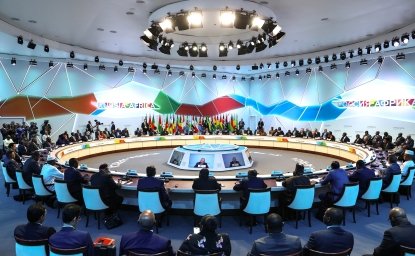
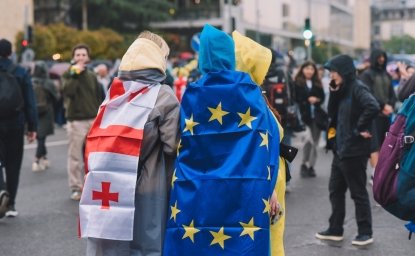
- Governance
Georgian Politics After Controversial “Foreign Agent” Law

